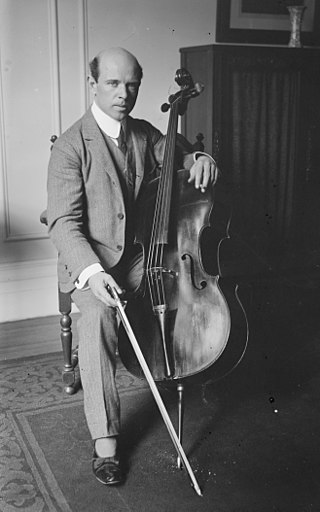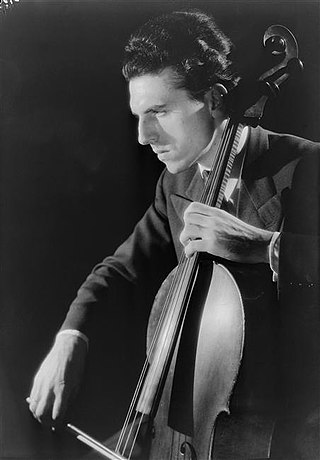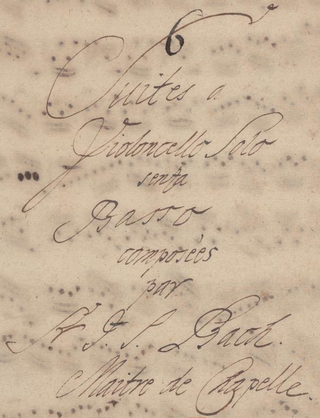Related Research Articles

Pau Casals i Defilló, known in English by his Castilian Spanish name Pablo Casals, was a Catalan and Puerto Rican cellist, composer, and conductor. He made many recordings throughout his career of solo, chamber, and orchestral music, including some as conductor, but he is perhaps best remembered for the recordings he made of the Cello Suites by Bach. He was awarded the Presidential Medal of Freedom in 1963 by President John F. Kennedy.

Paul Tortelier was a French cellist and composer. After an outstanding student career at the Conservatoire de Paris he played in orchestras in France and the US before the Second World War. After the war he became a well-known soloist, playing in countries round the globe. He taught at conservatoires in France, Germany and China, and gave televised masterclasses in England. He was particularly associated with the solo part in Richard Strauss's Don Quixote, cello concertos by Elgar and others, and Bach's Cello Suites.

The six Cello Suites, BWV 1007–1012, are suites for unaccompanied cello by Johann Sebastian Bach (1685–1750). They are some of the most frequently performed solo compositions ever written for cello. Bach most likely composed them during the period 1717–1723, when he served as Kapellmeister in Köthen. The title given on the cover of the Anna Magdalena Bach manuscript was Suites à Violoncello Solo senza Basso.

Steven Isserlis is a British cellist. An acclaimed soloist, chamber musician, educator, writer and broadcaster, he is widely regarded as one of the leading musicians of his generation. He is also noted for his diverse repertoire and distinctive sound which is deployed with his use of gut strings.
David Soyer was an American cellist.

Antonio Janigro was an Italian cellist and conductor.

Mats Lidström is a Swedish solo cellist, recording artist, chamber musician, composer, teacher and publisher.

Jian Wang is a Chinese cellist. A soloist, chamber musician, recording artist and teacher, he was the first Chinese musician to ever sign an exclusive contract with Deutsche Grammophon.
Laszlo Varga was a Hungarian-born American cellist who had a worldwide status as a soloist, recording artist, and authoritative cello teacher.
Ennio Bolognini was an Argentine-born American cellist, guitarist, composer, conductor, professional boxer, pilot, and flight instructor. Though seldom remembered today, his musical virtuosity was widely admired by his contemporaries during his lifetime. Pablo Casals praised him as "the greatest cello talent I ever heard in my life". Gregor Piatigorsky told Christine Walevska's father, "No, I am not the greatest cellist in the world; neither is Feuermann. The greatest is the Argentine Bolognini."

Diran Alexanian was an Armenian cello teacher and one of the world's greatest virtuoso cellists.

André-Nicolas Navarra was a French cellist and cello teacher.
Maurice Gendron was a French cellist, conductor and teacher. He is widely considered one of the greatest cellists of the 20th century. He was an Officer of the Legion of Honor and a recipient of the National Order of Merit. He was an active member of the French Resistance during World War II.

Philippe Muller is a French cellist.
Antônio Meneses Neto is a Brazilian cellist with the National Symphony Orchestra, was born into a family of musicians. His father was first horn player at the Opera of Rio de Janeiro. He began to study the cello when he was ten. During a tour in South America, the famous cellist Antonio Janigro met him and asked him to join his classes in Düsseldorf and then in Stuttgart. In 1977, he won the first prize at the International Competition in Munich and in 1982 he was awarded first prize and gold medal at the Tchaikovsky Competition in Moscow.

Nathan "Tossy" Spivakovsky, a Jewish, Russian Empire-born, German-trained violin virtuoso, was considered one of the greatest violinists of the 20th century.

Michael Flaksman was an American cellist.
Fritz Magg was a renowned Austrian-American cellist, known for his career spanning over six decades as a soloist, symphony and chamber ensemble performer, and educator.
Thomas George Igloi was a British cellist. He was born in Budapest, Hungary and started playing the cello at the age of eight with Emöke Csáth-Vasváry,
Edmund Kurtz was a Russian-born Australian cellist and music editor. He was renowned for his "impeccable technique", "innate musicality", and his "rich tone", with a "warm, sensuous quality that seldom loses its luster". In a career spanning 60 years, he performed internationally as a soloist and chamber musician. His edition of Bach's Suites for solo cello, drawn upon facsimiles of the manuscript of Anna Magdalena Bach and showing them opposite each page, is recognized as one of his greatest achievements, and was described as "the most important edition of the greatest music ever written for the instrument".